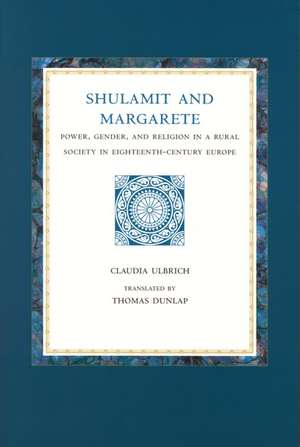Shulamit and Margarete: Power, Gender, and Religion in a Rural Society in Eighteenth-Century Europe
Autor Claudia Ulbrich Traducere de William V. Dunlapen Limba Engleză Paperback – 22 mai 2005
Preț: 392.37 lei
Preț vechi: 461.62 lei
-15% Nou
Puncte Express: 589
Preț estimativ în valută:
75.08€ • 78.81$ • 62.32£
75.08€ • 78.81$ • 62.32£
Carte indisponibilă temporar
Doresc să fiu notificat când acest titlu va fi disponibil:
Se trimite...
Preluare comenzi: 021 569.72.76
Specificații
ISBN-13: 9780391042278
ISBN-10: 0391042270
Pagini: 326
Dimensiuni: 160 x 240 mm
Greutate: 0 kg
Ediția:New.
Editura: Brill
Colecția Brill
ISBN-10: 0391042270
Pagini: 326
Dimensiuni: 160 x 240 mm
Greutate: 0 kg
Ediția:New.
Editura: Brill
Colecția Brill
Public țintă
Anyone interested in the history of the Early Modern Period, Gender Studies, Cultural Studies, and Jewish History.Notă biografică
Claudia Ulbrich, Dr. phil. (1977) University of Saarbrücken, is Professor of Modern History at the Free University of Berlin. She has published extensively on the history of rural societies in the early modern period and on gender history. She is co-editor of L'Homme. Zeitschrift für Feministische Geschichtswissenschaft.
Recenzii
'This exceptionally interesting book uses micro-level evidence to address big questions – the position of women, the nature of community, and the complex interplay of culture and institutions. Anyone interested in women’s history will find that this book does not have a dull page in it: the empirical evidence is extraordinarily interesting in itself, but on top of that it is constantly being placed in the wider context of what was happening in other parts of Europe and the general questions it helps us answer. The author’s treatment of the complex, many-stranded, and ambiguous relationships between Catholics and Jews, men and women, insiders and outsiders in this eighteenth-century village is delicate and sure in touch – a model of its kind. Above all, this book is extraordinarily original and impressive in laying bare the coercive realities behind communal institutions and strategies – especially in their effects on women, minorities, and outsiders – more thoroughly and vividly than any other study I know.'
Sheilagh Ogilvie, University of Cambridge, 2004.
'This fascinating and richly documented study takes us into the heart of an 18th-century village of Christians and Jews in Germany on the border of France. From her wide-ranging archival harvest, Claudia Ulbrich gives us a new view of the rhythms and conflicts of village life and the structures and strategies of families--all the more insightful because Jews and Catholics are placed side by side. Vivid, humane, and well-translated, Shulamit and Margarete is microhistory and gender history at their significant best.'
Natalie Zemon Davis, University of Toronto, author of The Return of Martin Guerre and Women on the Margins: Three Seventeenth-Century Lives.
Sheilagh Ogilvie, University of Cambridge, 2004.
'This fascinating and richly documented study takes us into the heart of an 18th-century village of Christians and Jews in Germany on the border of France. From her wide-ranging archival harvest, Claudia Ulbrich gives us a new view of the rhythms and conflicts of village life and the structures and strategies of families--all the more insightful because Jews and Catholics are placed side by side. Vivid, humane, and well-translated, Shulamit and Margarete is microhistory and gender history at their significant best.'
Natalie Zemon Davis, University of Toronto, author of The Return of Martin Guerre and Women on the Margins: Three Seventeenth-Century Lives.
